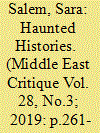|
|
|
Sort Order |
|
|
|
Items / Page
|
|
|
|
|
|
|
| Srl | Item |
| 1 |
ID:
167657


|
|
|
|
|
| Summary/Abstract |
This article revisits the Nasserist project through the lens of haunting. It explores the afterlives of Nasserism, in particular in relation to Egypt’s move toward a free market economy from the 1970s onwards. To do this, I explore the Nasserist project in order to excavate some of the promises that were made and to trace the legacies these created. I argue that both these promises—only partially fulfilled—and the social violence they at times contained—continued to act as powerful political memories that limited Egyptian politics in the decades that followed. Thinking of Nasserism as a form of haunting allows for a deeper understanding of how different political projects seep into one another, problematizing the notion of a linear teleological or providential trajectory consisting of distinct eras. In distinction to work that has mobilized the concept of haunting (originally theorized by Jacques Derrida) in order to elaborate on the historical manifestation of damaging or violent legacies in the present, I argue that Nasserist forms of haunting should be read as both a productive and destructive normative force in the present. This article puts forward examples of both, particularly in relation to questions of social justice, socialism, and anti-imperialism.
|
|
|
|
|
|
|
|
|
|
|
|
|
|
|
|
| 2 |
ID:
167654


|
|
|
|
|
| Summary/Abstract |
Memory-making and the use of memory is always political, and more visibly so in times of crisis, conflict and transition. The current situation in the Middle East and North Africa is no exception to this, where we have seen history, and specific narratives stemming from it, being mobilized toward certain political goals. In taking time as a distinct analytical category, this special issue aims to show that its explicit consideration transforms the ways in which we understand current political dynamics in the Middle East and North Africa. Both memory and time can be illuminating in drawing connections between the political, the economic and the social, thereby shedding new light on old conflicts on the one hand, and bridging the gap between the political and the social/cultural on the other.1
1 Alon Confino (1997Confino, A. (1997) Collective Memory and Cultural History: Problems of Method, American Historical Review, 102(5), pp. 1386–1403.
[Crossref], [Web of Science ®] , [Google Scholar]
) Collective Memory and Cultural History: Problems of Method, The American Historical Review, 102(5), pp. 1386–1403.
View all notes
As Charles Tilly noted, the politics of memory can tell us about both shared historical experiences and their effects on politics today, as well as the contestation or coercion over interpretations of the past—and present.2
|
|
|
|
|
|
|
|
|
|
|
|
|
|
|
|
|
|
|
|
|